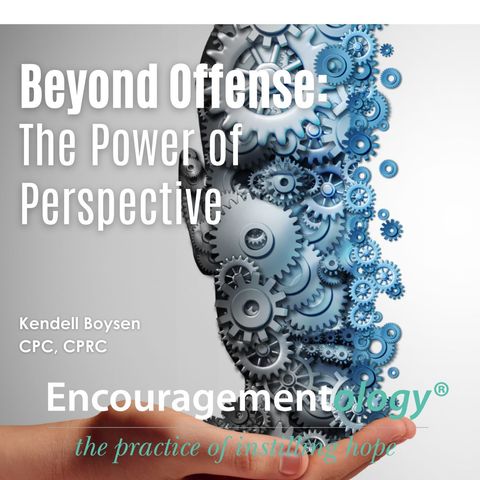Beyond Offense: The Power of Perspective

Scarica e ascolta ovunque
Scarica i tuoi episodi preferiti e goditi l'ascolto, ovunque tu sia! Iscriviti o accedi ora per ascoltare offline.
Descrizione
SHOW NOTES: On this show…we are making the effort to get beyond the offense as we seek the power of perspective. Are you quick to react and to respond, in...
mostra di più- Shift from Debate to Dialogue
- Focus on conversation, not competition: Instead of trying to “win” or prove your point, approach the discussion as an exchange of ideas where both parties can learn something new. This mindset change encourages openness.
- Ask more questions: Engage with genuine curiosity. By asking, “Can you explain more about how you see this?” you demonstrate a willingness to understand, not just argue.
- Identify Shared Values or Goals
- Highlight common interests: Look for areas where both parties agree, even if you differ on how to achieve them. For example, if discussing a divisive issue like policy, you might say, “It sounds like we both care about improving our community, even if we see different paths to get there.”
- Focus on universal values: Appeal to values that resonate with everyone, such as fairness, respect, or safety. These can act as touchpoints to ground the conversation in shared human concerns.
- Acknowledge Valid Points on Both Sides
- Validate where appropriate: Acknowledging that the other person’s perspective has merit can diffuse tension and promote connection. For instance, “I can see why you’d feel that way because…” This shows respect for their viewpoint and encourages reciprocity.
- Recognize complexity: Instead of viewing issues as black-and-white, admit that most topics have nuances. Phrases like, “This is a complex issue, and I see how different experiences could lead to different perspectives,” can open the door to finding middle ground.
- Practice Active Listening
- Listen to understand, not to respond: Make sure the other person feels heard by fully focusing on what they’re saying instead of planning your rebuttal. You could restate their points to confirm understanding, like, “So what I’m hearing is…”
- Pause before responding: Give yourself a moment to process what’s been said before reacting. This helps prevent defensive replies and keeps the conversation thoughtful.
- Humanize the Other Side
- Personal stories over abstract arguments: Ask the other person to share personal experiences that shaped their beliefs. Stories make abstract issues feel real and relatable, fostering empathy. Sharing your own experiences can also make your stance more approachable.
- Find out more about their background: By asking, “What experiences have led you to that belief?” you create an environment where personal stories reveal why they think the way they do. This helps you understand their perspective on a deeper level.
- Reframe the Conflict as a Problem to Solve Together
- Collaborate, don’t compete: Position the conversation as a joint effort to find solutions. Instead of arguing for individual positions, ask, “What do you think would be a good way to move forward that addresses both of our concerns?”
- Use inclusive language: Say “we” and “us” instead of “you” and “them” to remind the other person that you’re both part of the same larger community or working toward a similar goal.
- Challenge Assumptions, Not Identities
- Focus on ideas, not people: When disagreements arise, critique the ideas or behavior, not the person. Avoid phrases that target identity or values, such as “You’re wrong” or “You always think like that,” and instead say, “This particular idea doesn’t resonate with me because…”
- Avoid stereotyping: Refrain from making assumptions about the other person’s entire belief system based on one viewpoint. Ask clarifying questions to understand the specific nuance behind their opinion.
- Create a Safe Space for Vulnerability
- Set a respectful tone: Set ground rules for the conversation, ensuring that both parties feel safe to express their views without fear of ridicule. “I want this to be a space where we can explore ideas respectfully. Let’s try to focus on understanding each other.”
- Admit when you’re wrong: If you realize you’ve made a mistake or misunderstood something, admit it openly. This encourages the other person to do the same, making it easier to reach common ground.
- Look Beyond the Surface Conflict
- Ask “why” to get to deeper concerns: Instead of fixating on surface-level disagreements, probe deeper. Ask, “Why does this matter so much to you?” Often, the underlying concern is something more universal, like security, belonging, or fairness, which can help bridge gaps.
- Avoid binary thinking: When discussing divisive issues, don’t frame the conversation as one person being right and the other wrong. Acknowledge that multiple perspectives can coexist and that it’s possible to hold differing views without being enemies.
- End on a Positive Note
- Agree to disagree, respectfully: If the conversation doesn’t result in full agreement, that’s okay. It’s important to acknowledge and respect differences while maintaining civility. Ending with, “I appreciate hearing your thoughts, and even though we don’t fully agree, I value this conversation,” preserves the relationship.
- Summarize what you agree on: Before wrapping up, highlight any common points you’ve found. “So we both agree that [shared value], even if we see it differently, that’s a great starting point.”
- Be willing to learn: Embrace the mindset that every conversation is an opportunity for growth, not a battlefield. Accept that your understanding could evolve through dialogue and be open to revising your views when presented with compelling information or new perspectives.
Informazioni
| Autore | KKFI Community Podcasts |
| Organizzazione | KKFI Community Podcasts |
| Sito | - |
| Tag |
-
|
Copyright 2024 - Spreaker Inc. an iHeartMedia Company

Commenti